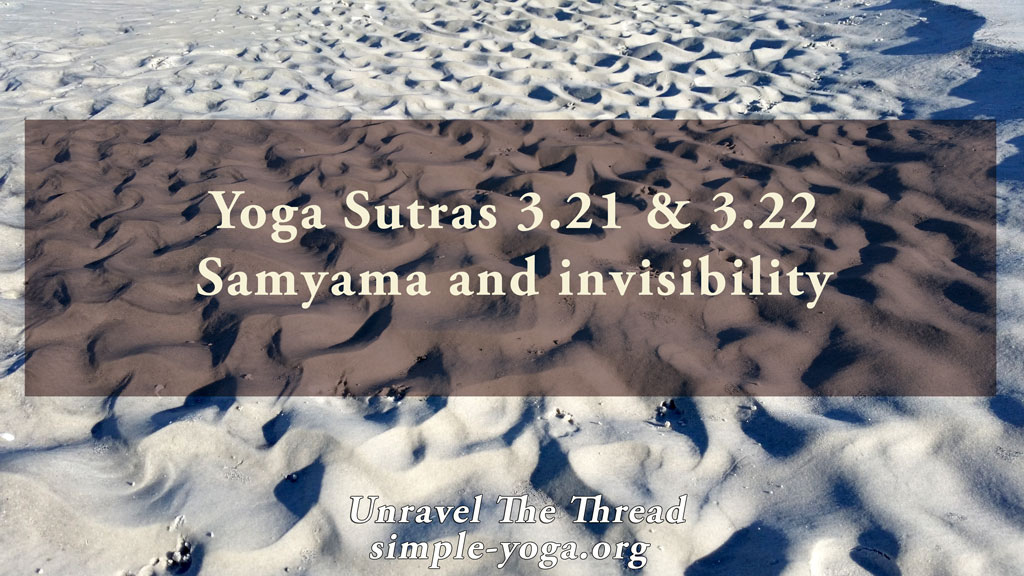
3.21 and 3.22 Samyama and invisibility
September 25, 2021
3.24 Samyama on friendliness
October 11, 2021
3.21 and 3.22 Samyama and invisibility
September 25, 2021
3.24 Samyama on friendliness
October 11, 20213.23 Samyama and Karma

3.23 Meditative integration (samyama) on active (prarabdha) and dormant (sanchita) karma, or on the omens of death, discloses the time of death.
Consistent with the notion that a sutra is a thread of related concepts brought together, this sutra is another place where Patañjali connects to previously presented ideas, like the general idea of karma in sutras 2.12, 2.13 and 2.14. Karma means action, and every action has consequences, if only because everything in existence is deeply interconnected. The five afflictions you carry with you (2.2 to 2.9) cause you to act in certain ways that leave a mark (samskara). Those impressions accumulate in the store of karma (karmashaya) (2.12), determining the characteristics of your life as well as pleasant or unpleasant experiences, depending on your original intention and action (2.13-2.14).
Those impressions manifest in one of the three states listed in aphorism 3.14. They can be dormant, active, or potential. Dormant karma is called sanchita karma, consisting of impressions that await the appropriate conditions to manifest. The second type of karma is known as prarabdha karma, the karma that is currently active. The third kind of karma is agami karma, the karma that is currently accumulating because of your current intentions, actions, and interactions. This future karma will manifest at a later point in this or a future lifetime. According to this perspective, your actions will keep generating your future experiences unless you act without any expectations whatsoever; or you surrender fully to life’s perfection; or you have reached integration (samadhi) and your actions are filled with wisdom and in harmony with the ongoing flow of life.
In sum, if you practice samyama on your dormant or active karma, you will eventually learn when your current life will come to an end. Hence, this sutra also connects to the concept presented as the fifth of the afflictions in 2.3 and more explicitly in 2.9, fear of dying, abhinivesha. Rather than seeing death as something to be afraid of, you can choose to see your own death as both the culmination of the life process initiated at your birth as well as a strong motivation to participate consciously and deliberately in all aspects of your life. To what extent are you aware of the connections between the events emerging in your daily life and your previous actions? Is it possible that you can gain insight on the repercussions of your current actions and interactions?
This sutra also mentions the omens or portents. In the earliest commentary to the Yoga Sutra, Vyasa indicates that there are three types of portents that announce impending death: personal (adhyatmika), elemental (adhibhautika), and divine (adhidaivika). According to Vyasa, the personal omens include not perceiving any light with one’s eyes closed and not hearing any bodily sounds when one closes one’s ears. The elemental or impersonal omens consist of suddenly seeing one’s dead ancestors or the messengers of death. The third kind of omen is seeing deities or heavenly beings. A fruitful avenue of exploration is to contemplate your relationship to the notion of death. Also, what can you learn by meditating on your own eventual demise? As usual, if you choose to explore this sutra, ensure that you are doing it in a life-affirming way that does not generate agitation or reactivity.
As usual, one more way of exploring the meaning of this sutra is by chanting it.
You can choose to chant it in its traditional form with some of the words coming together:
3.23 sopakramaṃ nirupakramaṃ ca karma tatsaṃyamātaparāntajñānam ariṣṭebhyo vā
सोपक्रमं निरुपक्रमं च कर्म तत्संयमातपरान्तज्ञानम् अरिष्टेभ्यो वा ॥२३॥
Another option is to chant each word in the sutra individually:
- sopakramaṃ
- nirupakramaṃ
- ca
- karma
- tat
- saṃyamāt
- aparānta
- jñānam
- ariṣṭebhyaḥ
- vā
If you prefer, you may listen to the podcast:
This is an excerpt from the book Unravel the thread: Applying the ancient wisdom of yoga to live a happy life
If you find Simple-Yoga.org and Unravel the thread useful, consider supporting my labor with a donation, you may also donate using PayPal or Venmo. Thank you!
